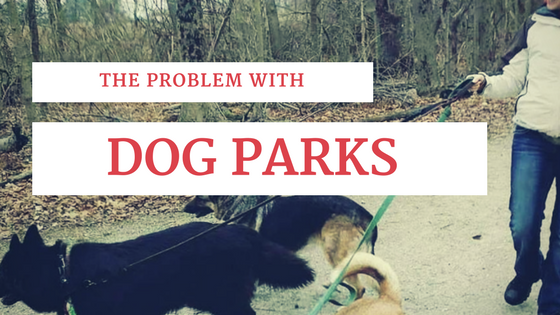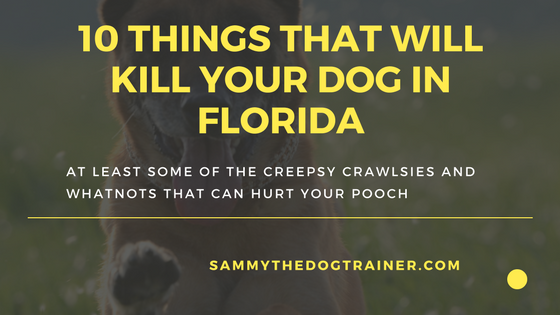The Problem With Dog Parks
The Problem with Dog Parks
We live in a day when are dogs are our four-legged, slurpy children. As a professional dog trainer, I do not necessarily think this is an entirely negative development. I will admit it- my dog is my fur child. I love him that much. The retail industry reflects our love for our fur babies with a boom in doggy daycares, dog spas, doggy "barkeries" and baked goods companies, all natural pet product lines, doggy community events, and so on. Americans spent close to $70 billion on their pets in 2017 according to John Gibbon's article on the pet industry.

Some take a disdainful approach to the anthropomorphism of our dogs, claiming it to be an inaccurate assessment of the reality of dog. Freud, himself, had a theory that humans substitute the relationships they would have with other people with their pets. Although many researchers have tried to make this out to be unhealthy and macabre, Freud himself was an animal lover (he had German Shepherd dogs- go team!) (Gavriele-Gold, 2011). The field of canine cognition is booming, and part of the revelation in these studies is how canine has evolved with man to think in a symbiotic, and sometimes similar way to people. The key word here is sometimes.
This is where the hard pill to swallow comes. Even though our best fur buddies are super smart, and we are realizing more and more how developed their abilities are, they are still dogs. And sometimes treating your dog like he or she is a human child can be DANGEROUS to your dog. You must understand your dog as your dog is, not as you would romanticize him or her to be.
Our dogs should be able to play with the other fur-children and all just get along right? Wrong. Your 2 year old "baby" is a fully formed, adult dog with fully formed adult dog priorities. Dog originally were pack animals, and many still derive a great deal of benefit with interacting with other dogs. However, in the course of the 14-33 thousand year relationship man has had with dog, man has bred dog for specific purposes. While the advent of specific dog breeds is mostly a Victorian era machination, we have had dog-types for thousands of years. What do I mean by dog types? Basically it is breeding a dog for a job. Before there were specific breeds, there were still coursers (chasing rabbits), retrievers, herding dogs, pastoral guard dogs or shepherds...the Romans even had a giant mastiff type dog they used in conquests called the Molosser, which was the grandfather to the bully breeds today. The list goes on. Sometimes when man was breeding for these specific purposes, sociability was not high up on the list of priorities, and so some of dog's natural pack instinct with other dogs fell by the wayside. It depends on your dog whether or not they still feel an inherent need to interact with other dogs and gain fulfillment through such activity. If your dog does not, then he or she should still behave on the leash around other dogs, no exception. But it probably is not wise to force him or her to be a doggy daycare dog, as it would lead to unnecessary stress.
The debate as to how strict a domestic dog pack's social hierarchy and reliance on dominance behavior is still hotly debated among academics. However, it is noted that dogs' pack structure, while still similar to wolves, is not strictly the same. Wolf packs must cooperate in a greater coordination to bring down large game. Dogs, on the other hand, have exhibited a greater satisfaction with the status quo once a hierarchy has been established, only upsetting it as major life events occur (Cafazzo, Valsecchi, Bonanni, & Natoli, 2010; Marshall, Virányi, & Range, 2015). When a new member is introduced to a pack, it is usually one at a time or through birth in a litter. At a dog park, every dog is potentially new to the pack, and there is no established pack order unless you have regulars whose dogs are acquainted already. Some dogs can handle this fluidity in structure and some cannot. It is not fair to expect your dog to cope with this stress because of misguided notion that all dogs are like children and should be able to get along and play nice. To be fair, some human kids are serial killers in the making too. I would not want anyone to have to play nice with them either.
 |
| Some of the regulars at our local park |

Just because your dog turns into a puddle of nerves and obviously does not enjoy a jaunt to the dog park does not necessarily mean he or she cannot enjoy interacting with other dogs. It may be he or she simply prefers the company of dogs in a more structured setting- dogs he or she already knows and likes. Or it is possible, through the years of breeding for specific purposes and human companionship, that your dog simply does not like other dogs. Does this mean there is something wrong with your dog? No. It means your dog is a dog. Respect that fact.
Most (not all) dogs can be forced through behavioral modification over time and with expertise to be relatively safe around other dogs, even if they really do not like other dogs. With any dog interactions, there will be good and bad days, hiccups and obstacles. You have to ask yourself if it is worth the risk to you, your dog, and other dogs, to force the issue. Sometimes it is and sometimes it is not.
Cheers,
Sammy the Dog Trainer
References
Cafazzo S, Valsecchi P, Bonanni R, Natoli E (2010) Dominance in relation to age, sex and competitive contexts in a group of free-ranging domestic dogs. Behav Ecol 21: 443–455.
Gavriele-Gold, J. (2011). The human-canine bond: New learnings and a changing rationality from a psychoanalytic perspective. Psychoanalytic Review, 98(1), 91-105. doi:http://dx.doi.org.library.capella.edu/10.1521/prev.2011.98.1.91
Marshall-Pescini, S., Virányi, Z., & Range, F. (2015). The effect of domestication on inhibitory control: Wolves and dogs compared. PloS One, 10(2), e0118469. doi:10.1371/journal.pone.0118469









Comments
Post a Comment